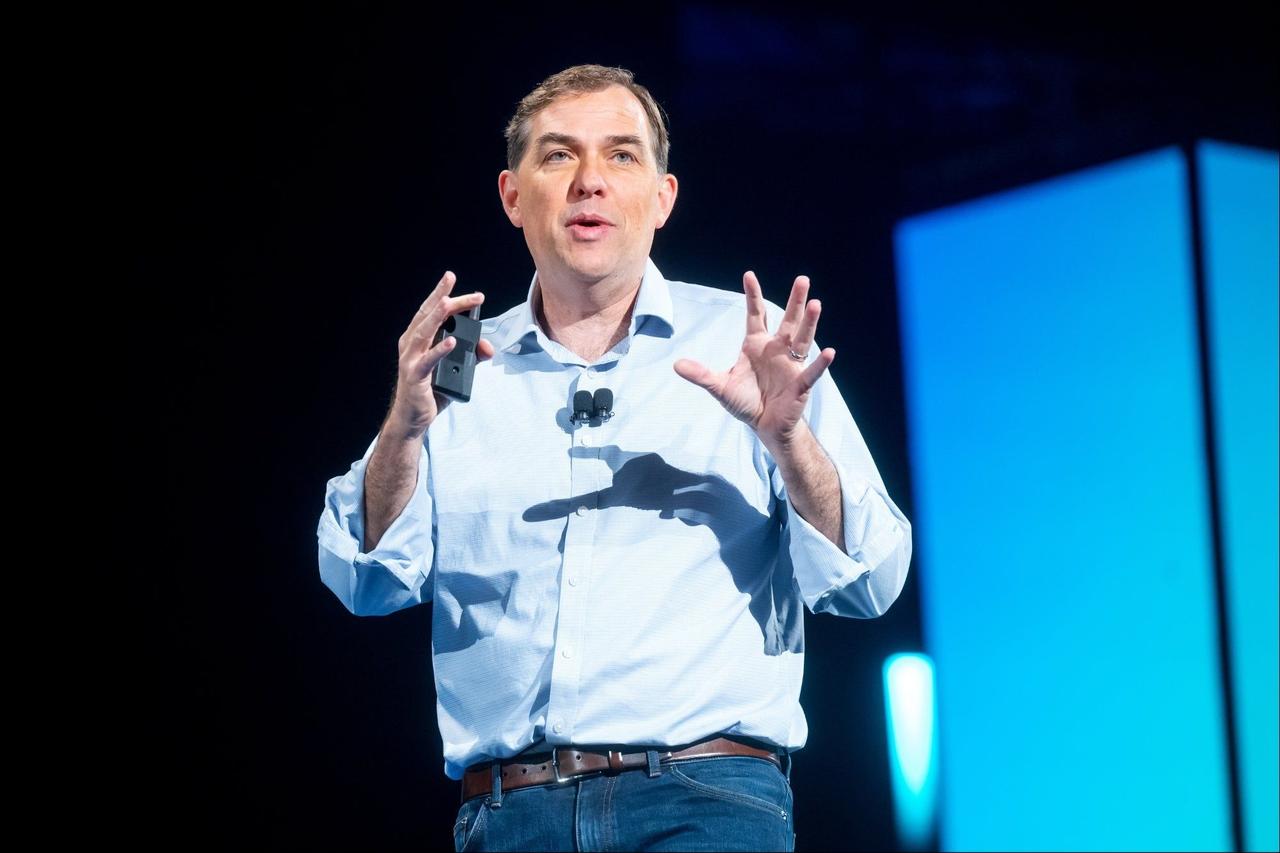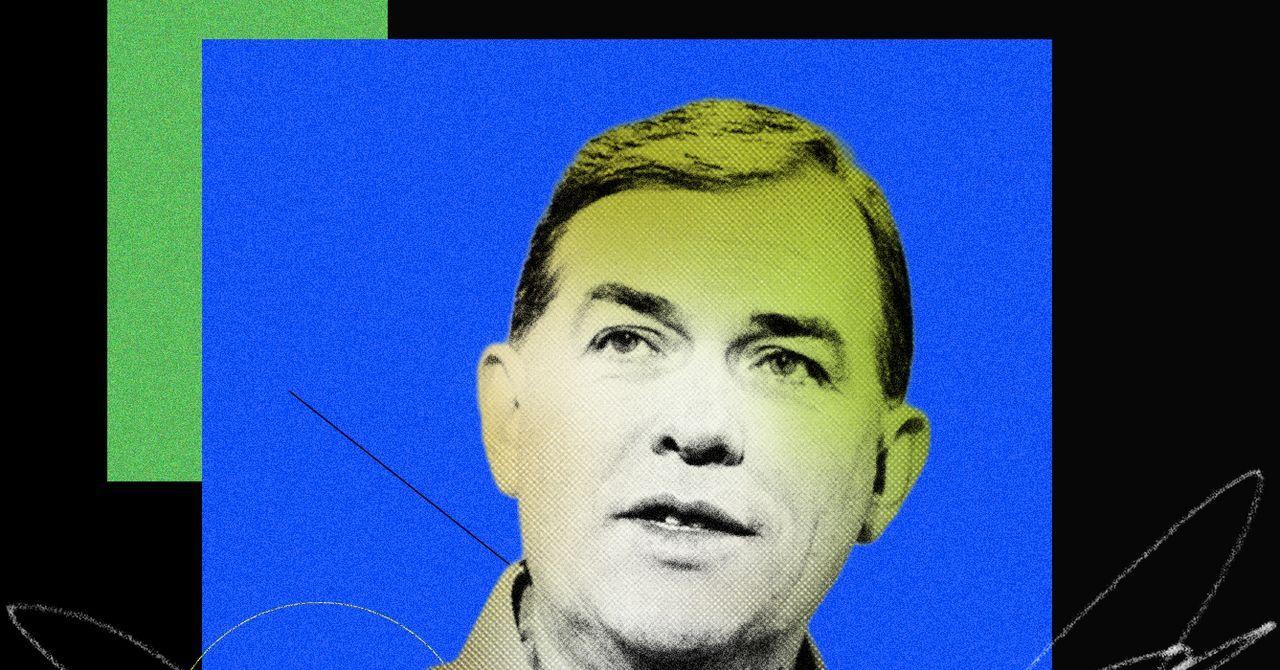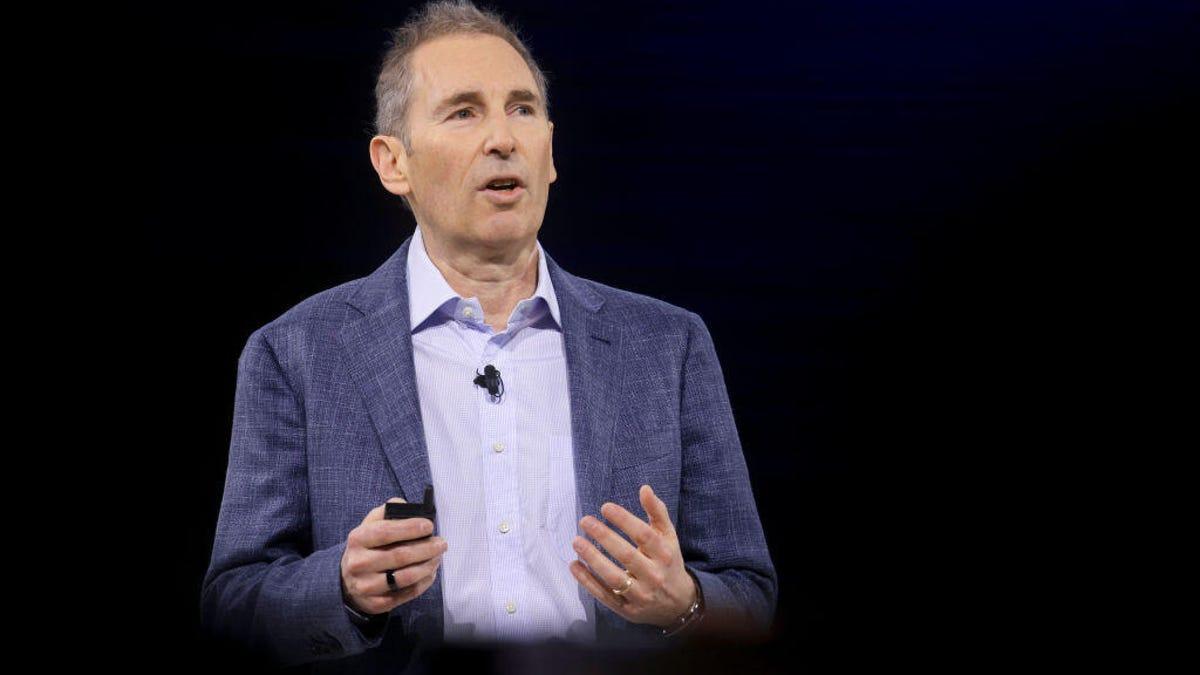AWS CEO Matt Garman Criticizes Replacing Junior Staff with AI, Emphasizes Long-Term Talent Development
5 Sources
5 Sources
[1]
AWS CEO says AI replacing junior staff is 'dumbest idea'
Amazon Web Services CEO Matt Garman has suggested firing junior workers because AI can do their jobs is "the dumbest thing I've ever heard." Garman made that remark in conversation with AI investor Matthew Berman, during which he talked up AWS's Kiro AI-assisted coding tool and said he's encountered business leaders who think AI tools "can replace all of our junior people in our company." That notion led to the "dumbest thing I've ever heard" quote, followed by a justification that junior staff are "probably the least expensive employees you have" and also the most engaged with AI tools. "How's that going to work when ten years in the future you have no one that has learned anything," he asked. "My view is you absolutely want to keep hiring kids out of college and teaching them the right ways to go build software and decompose problems and think about it, just as much as you ever have." Naturally he thinks AI - and Kiro, natch - can help with that education. Garman is also not keen on another idea about AI - measuring its value by what percentage of code it contributes at an organization. "It's a silly metric," he said, because while organizations can use AI to write "infinitely more lines of code" it could be bad code. "Often times fewer lines of code is way better than more lines of code," he observed. "So I'm never really sure why that's the exciting metric that people like to brag about." That said, he's seen data that suggests over 80 percent of AWS's developers use AI in some way. "Sometimes it's writing unit tests, sometimes it's helping write documentation, sometimes it's writing code, sometimes it's kind of an agentic workflow" in which developers collaborate with AI agents. Garman said usage of AI tools by AWS developers increases every week. The CEO also offered some career advice for the AI age, suggesting that kids these days need to learn how to learn - and not just learn specific skills. "I think the skills that should be emphasized are how do you think for yourself? How do you develop critical reasoning for solving problems? How do you develop creativity? How do you develop a learning mindset that you're going to go learn to do the next thing?" Garman thinks that approach is necessary because technological development is now so rapid it's no longer sensible to expect that studying narrow skills can sustain a career for 30 years. He wants educators to instead teach "how do you think and how do you decompose problems", and thinks kids who acquire those skills will thrive. ®
[2]
"The dumbest thing I've ever heard" - AWS CEO slams plans for AI to replace junior human workers
Amazon Web Services (AWS) CEO Matt Garman has called the idea of firing junior workers because AI can do their jobs "the dumbest thing I've ever heard". Speaking in a YouTube interview with Matthew Berman, Garman backed up his position by arguing junior staff are usually the least expensive, but also the most engaged with AI tools, therefore they're best set up to feel the boost of AI in their workflows - rather than be replaced by it. Taking a longer-term look at the scenario, Garman added without junior employees gaining experience, companies will have no skilled workforce in the future. Consequentially, Garman advocated for the continued hiring of graduates to teach them core software and problem-solving skills to futureproof against future workplace challenges, like today's skills shortages. He still encourages the use of AI tools, but to assist rather than replace junior talent. When asked about how much of AWS's code is now AI-written (we know that at least a third of Google, Meta and Microsoft's code is now AI-generated), Garman described the notion as a "silly metric," but acknowledged over 80% of the company's developers now use AI in their workflows across code generation and more. Garman indicated "curious" workers will get the most out of AI - combining their own desire to learn more with Amazon training initiatives. He added workers should "be flexible, be willing to learn, and be willing to accept that their job may be a little bit different," noting that this is a time of transition. Broadly positive for the future of jobs, Garman's thoughts align with Amazon CEO Andy Jassy's thoughts on AI's impact on the workforce. In June 2025, ex-AWS CEO Jassy acknowledged that AI will ultimately end up replacing some human workers, but it would free up other jobs to avoid a net loss of roles.
[3]
'The dumbest thing I've ever heard': Amazon Web Services CEO lambasts replacing junior employees with AI, but he still loves AI
AWS CEO Matt Garman spoke up for entry-level jobs, but still insists AI will change all jobs. In an interview with investor and AI evangelist Matthew Berman this week, AWS CEO Matt Garman shut down the idea that junior employees should be replaced by AI, calling it "the dumbest thing I've ever heard." "They're probably the least expensive employees you have, they're the most leaned in to your AI tools, and how's that going to work when you go, like, 10 years in the future and you have no one that has built up or learned anything? "My view is like, you absolutely want to keep hiring kids out of college and teaching them the right ways to go build software and decompose problems and think about it." But overall, Garman still has the optimistic take on AI's impact on the job market you commonly see from tech executives. "I think AI has the potential to transform every single industry, every single company, and every single job," Garman said. "But it doesn't mean they go away. It has transformed them, not replaced them." He added that, "I'm not minimizing that uncertainty that people will have and I know people are worried about [AI] and I think one of the things is, embrace that technology. The more you can embrace that technology, be flexible, understand how it can help you do your job faster and better, [then] I think the better off people are going to be as they make that transition." It's somewhat refreshing to hear a tech CEO defend entry-level jobs, especially with some estimates showing some 50% of all entry-level office jobs could be eliminated by AI in the coming years. Unfortunately, these comments come just a month after hundreds of Amazon Web Services employees were laid off. Amazon explained the layoffs in a statement to Reuters, commenting: "These decisions are necessary as we continue to invest, hire, and optimize resources to deliver innovation for our customers." While that statement doesn't mention AI, Amazon CEO Andy Jassy made comments back in June that seemed to hint that AI will be responsible for job elimination. Jassy said in an employee memo, "We will need fewer people doing some of the jobs that are being done today, and more people doing other types of jobs. It's hard to know exactly where this nets out over time, but in the next few years, we expect that this will reduce our total corporate workforce as we get efficiency gains from using AI extensively across the company."
[4]
'One of the Dumbest Things I've Ever Heard': Here's Why Companies Shouldn't Replace Entry-Level Workers With AI, According to the CEO of Amazon Web Services
Big tech firms, including Meta and Microsoft, have slowed down their hiring of recent graduates. Amazon's cloud chief is urging business leaders to hold on to their junior employees -- and stop replacing them with AI. On an episode of the "Matthew Berman" podcast that aired on Tuesday, Amazon Web Services CEO Matt Garman said that using AI tools in place of junior employees was "one of the dumbest things I've ever heard" because these employees are "the least expensive" and "the most leaned into your AI tools." Related: Amazon Cloud CEO Predicts a Future Where Most Software Engineers Don't Code -- and AI Does It Instead Garman encouraged companies to continue hiring and training their junior staff members. He asked students to focus on learning critical thinking skills instead of specializing in one field that could be obsolete within the next few decades due to AI. Garman's new remarks urging companies to hire and hold onto entry-level talent come at a time when big tech firms like Meta and Microsoft have slowed down the hiring of recent graduates. According to a report released earlier this year from SignalFire, a company that analyzes the job movements of 650 million employees on LinkedIn, new graduates comprised 7% of new hires at big tech companies last year, down from 25% in 2023. SignalFire's Head of Research, Asher Bantock, said that AI was a main reason for the drop in junior tech jobs, because the technology can take over routine, entry-level tasks like basic coding and research. Related: The CEO of $61 Billion Anthropic Says AI Will Take Over a Crucial Part of Software Engineers' Jobs Within a Year Meanwhile, Goldman Sachs researchers wrote in a note earlier this month that unemployment has risen by nearly 3% since 2024 for 20- to 30-year-olds who want to work in tech, more than four times higher than the overall rate. In the note, the company's Chief Economist, Jan Hatzius, predicted that AI will replace up to 7% of all U.S. employees within the next decade, causing the unemployment rate to grow. Adding to the research, some AI leaders have warned that the technology will replace entry-level jobs. Anthropic CEO Dario Amodei said in May that AI would eliminate half of junior, white-collar jobs within the next five years. Geoffrey Hinton, the Nobel Prize winner known for his pioneering work in AI, predicted in June that AI would eventually "replace everybody" in white-collar work. Related: Nvidia's CEO Says It No Longer Matters If You Never Learned to Code Nvidia CEO Jensen Huang explained in a podcast episode last month that "the one thing we know for certain" is that people who use AI will replace those who don't. "If you're not using AI, you're going to lose your job to somebody who uses AI," Huang said at the time.
[5]
AWS CEO Says Firing Junior Staff For AI Is The 'Dumbest' Thing He's Ever Heard -- Warns Companies Risk Having No Talent Pipeline In 10 Years - Amazon.com (NASDAQ:AMZN)
Amazon Web Services CEO Matt Garman delivered a stark warning to business leaders rushing to replace entry-level workers with artificial intelligence tools, calling such moves "one of the dumbest things I've ever heard." Trending Investment OpportunitiesAdvertisementArrivedBuy shares of homes and vacation rentals for as little as $100. Get StartedInteractive BrokersTrade global markets with low costs and pro-level tools at Interactive Brokers.Get StartedRangeRange delivers AI-powered wealth management at a fraction of the cost. Get StartedRocket HELOCGet a HELOC with mid-600s credit -- borrow and repay on repeat. Get StartedPacasoJoin 10,000+ investors betting on Pacaso's global expansion at $2.90 per share.Get StartedWorthy BondsEarn 7% fixed interest with Worthy Bonds -- start investing with just $10.Get StartedNinjaTraderNinjaTrader gives you futures access with low day-trading margins.Get StartedIRA FinancialInvest your IRA or 401(k) in real estate, crypto, and more with IRA Financial. Get StartedAcornsGrow wealth effortlessly -- Acorns invests your spare change automatically. Get StartedSmartAssetFind a vetted financial advisor near you in minutes with SmartAsset's free tool. Get StartedJunior Staff Critical for Long-Term Strategy Speaking on the "Matthew Berman" podcast published Tuesday, Garman argued that junior employees represent the most cost-effective workforce segment and are typically the most adaptable to AI integration. "They're probably the least expensive employees you have. They're the most leaned into your AI tools," Garman said. "How's that going to work when you go like 10 years in the future and you have no one that has built up or learned anything?" The AWS chief emphasized that companies should continue hiring graduates and focus on teaching fundamental skills, including software development, problem-solving methodologies, and industry best practices. See Also: Nvidia's Reign At Risk? Dylan Patel Says Google's TPU, Amazon's Trainium Could Outshine GPUs If Sold To Public Skills Over Degrees in AI Economy Garman stressed that valuable skills in an AI-driven market aren't tied to specific college degrees. "If you spend all of your time learning one specific thing and you're like, 'That's the thing I'm going to be expert at for the next 30 years,' I can promise you that's not going to be valuable 30 years from now," he said. Instead, he recommended that students develop critical reasoning, creativity, and adaptability as technology continues evolving. Amazon's Broader AI Workforce Impact The comments come as parent company Amazon.com Inc. AMZN faces internal criticism over CEO Andy Jassy's announcement in June that AI will shrink the corporate workforce. Internal Slack messages viewed by Business Insider showed mixed employee reactions, with some calling it demotivating while others acknowledged it made Amazon's AI strategy explicit. Amazon has committed over $100 billion to AI infrastructure investments, including $13 billion for Australia's data center expansion through 2029, while freezing retail hiring budgets this year. Read Next: Palantir And Fujitsu Deepen Partnership With New Generative AI Agreement Disclaimer: This content was partially produced with the help of AI tools and was reviewed and published by Benzinga editors. Photo courtesy: Deep Pixel via Shutterstock AMZNAmazon.com Inc$230.70-0.34%Stock Score Locked: Edge Members Only Benzinga Rankings give you vital metrics on any stock - anytime. Unlock RankingsEdge RankingsMomentum73.34Growth91.23Quality63.55Value50.66Price TrendShortMediumLongOverviewMarket News and Data brought to you by Benzinga APIs
Share
Share
Copy Link
Amazon Web Services CEO Matt Garman strongly opposes the idea of replacing junior employees with AI, calling it "the dumbest thing I've ever heard." He emphasizes the importance of entry-level jobs for long-term talent development and advocates for AI as a tool to assist rather than replace workers.
AWS CEO Criticizes AI Replacing Junior Staff
Amazon Web Services (AWS) CEO Matt Garman has strongly criticized the notion of replacing junior employees with artificial intelligence (AI), calling it "the dumbest thing I've ever heard"
1
. In a conversation with AI investor Matthew Berman, Garman expressed his concerns about the long-term implications of such a strategy for companies and the workforce2
.
Source: Entrepreneur
The Importance of Junior Employees
Garman emphasized that junior staff are typically "the least expensive employees" and are often the most engaged with AI tools
1
. He argued that eliminating these positions could lead to a significant problem in the future: "How's that going to work when ten years in the future you have no one that has learned anything?"3
The AWS CEO stressed the importance of continuing to hire and train recent graduates, teaching them essential skills in software development, problem-solving, and critical thinking
4
. This approach, according to Garman, is crucial for maintaining a skilled workforce and ensuring companies have a talent pipeline for the future.
Source: The Register
AI as a Tool, Not a Replacement
While Garman is critical of replacing junior staff with AI, he remains optimistic about AI's potential to transform industries and jobs. He noted that over 80% of AWS developers now use AI in their workflows, but emphasized that AI should be used to assist rather than replace human workers
2
5
.Garman also criticized the practice of measuring AI's value by the percentage of code it contributes, calling it a "silly metric"
1
. He argued that the quality of code is more important than quantity, stating, "Often times fewer lines of code is way better than more lines of code"1
.The Changing Job Market and AI
The discussion comes at a time when big tech firms, including Meta and Microsoft, have slowed down their hiring of recent graduates
4
. Some AI leaders have predicted that AI could eliminate up to 50% of junior, white-collar jobs within the next five years4
.However, Garman's perspective aligns with Amazon CEO Andy Jassy's view that while AI may replace some jobs, it will also create new opportunities
2
. Garman advised workers to "be flexible, be willing to learn, and be willing to accept that their job may be a little bit different," acknowledging that this is a time of transition2
.Related Stories
Skills for the AI Age

Source: TechRadar
Garman offered career advice for the AI era, suggesting that young people should focus on developing critical thinking, creativity, and problem-solving skills rather than specializing in narrow technical areas
1
5
. He emphasized the importance of learning how to learn, given the rapid pace of technological change1
."I think the skills that should be emphasized are how do you think for yourself? How do you develop critical reasoning for solving problems? How do you develop creativity? How do you develop a learning mindset that you're going to go learn to do the next thing?" Garman stated
1
.Amazon's AI Investments and Workforce Impact
While Garman advocates for retaining junior staff, it's worth noting that Amazon has committed over $100 billion to AI infrastructure investments
5
. The company has also faced internal criticism over CEO Andy Jassy's announcement that AI will likely reduce the corporate workforce in the coming years5
.As the debate over AI's impact on the workforce continues, Garman's stance highlights the complex balance companies must strike between leveraging AI capabilities and maintaining a skilled, adaptable human workforce for long-term success.
References
Summarized by
Navi
[1]
[2]
Related Stories
AWS CEO Matt Garman says AI should not replace junior devs, warns of threats to talent pipelines
16 Dec 2025•Business and Economy

Amazon CEO Andy Jassy Predicts AI Will Reshape Workforce, Reducing Some Jobs While Creating New Opportunities
26 Jun 2025•Business and Economy

Amazon Web Services CEO Predicts AI Will Transform Software Development
22 Aug 2024

Recent Highlights
1
Google Gemini 3.1 Pro doubles reasoning score, beats rivals in key AI benchmarks
Technology

2
Meta strikes up to $100 billion AI chips deal with AMD, could acquire 10% stake in chipmaker
Technology

3
Pentagon threatens Anthropic with supply chain risk label over AI safeguards for military use
Policy and Regulation





